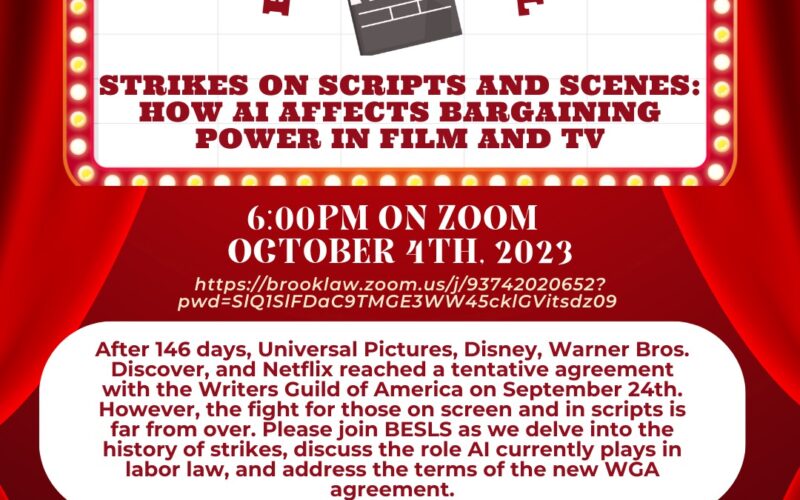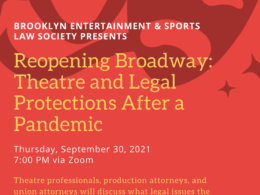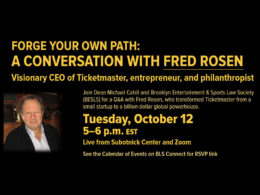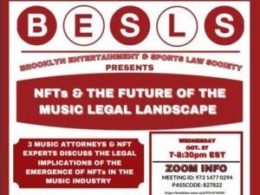On Wednesday, October 4th, the Brooklyn Entertainment and Sports Law Society held its annual Film and Television panel entitled “Strikes on Scripts and Scenes: How AI Affects Bargaining Power In Film and TV.”
The panel was moderated by Brooklyn Law Professor Marshall Silverman, who worked as a production attorney, business affairs executive, and production executive at several motion picture companies in New York, California, and London, including 23 years at Warner Bros. where he served as Vice-President & Senior Motion Picture Production Counsel. Professor Silverman has been associated with the development and production of over 40 feature films which, among many other things, required that he work with entertainment labor unions such as the WGA and SAG-AFTRA. Professor Silverman has lectured at Harvard Law School, Southwestern Law School, NYU Film School, and other schools; and is currently an adjunct Professor of Entertainment Law at Brooklyn Law School.
The panelists included Professor Amy Cyphert, Professor Dan Dargene, and Esther Cunningham.
Professor Amy Cyphert is a Lecturer in Law at the West Virginia University College of Law. Professor Cyphert developed and teaches a course on Artificial Intelligence and the Law. Professor Cyphert recent research has focused on generative artificial intelligence and its impact on the practice of law. She has also written about technology regulation and algorithmic decision making in the criminal justice system. In 2021, Professor Cyphert received the Privacy Papers for Policymakers Award from the Future of Privacy Forum for her article on machine-learning algorithms and online surveillance.
Professor Dan Dargene is a Professor of Labor and Employment Law at the University of North Texas Law School. Professor Dargene has amassed over 40 years of experience in labor and employment law. Before becoming a professor of law, Professor Dargene was a Senior Partner at Ogletree Deakins where he managed and organized all labor and employment law projects as well as tried cases and argued before the 10th Circuit Court of Appeals. In 2009, Professor Dargene was named one of the Best Lawyers in Dallas by D Magazine. In 2016 and 2017, Professor Dargene was the President of the State Bar of Texas Labor and Employment Committee.
On screen, Esther Cunningham can be seen as Paige in the film They/Them/Us, and Beth in the webseries The Go To (currently streaming on YouTube). Ms. Cunningham is producing/acting in For/Closure, a webseries currently in development. Here on New York City stages, she originated roles in The Carpet and The Grass Kills People. Ms. Cunningham studies at Act First Studio with Christopher Chwee. She is a proud member of SAG-AFTRA and has been joining them on the picket lines this summer.
The panel kicked off with a discussion of the history of entertainment unions. In the early twentieth century, writers, actors, and other individuals in the entertainment industry formed unions to protect their rights as artists against production companies. Since their inception, these unions have worked closely with their members and have advocated for equal and fair treatment of their union members. For example, unions can negotiate for higher minimum wages and health care benefits for their members through collective bargaining. Additionally, Congress has created several acts to further establish the rights of employees, including those who remain integral to the entertainment business. Some of the acts include OSHA, The Civil Rights Act of 1964, and the National Labor Relations Act of 1935.
On April 17th, 2023, the Writers Guild of America (WGA) went on strike, in part, to advance the worker’s rights of film and television writers. As a result of the strike, film and television writers were prohibited from working. This resulted in many films and television shows being put hold or canceled. Five months later, on September 27, 2023, the WGA came to an agreement to end the strike. Nearly two months after the WGA strike began, on June 5, 2023, the Screen Actors Guild and American Federation of Television and Radio Artists (SAG-AFTRA) followed suit and went on strike. While on strike, SAG-AFTRA members have not been allowed to participate in new projects with most production studios, attend red-carpet events, or promote their works on social media platforms. In addition to these strikes affecting writers and actors, they also have a greater impact on other industries such as food catering, location rentals, wardrobe, stylists, and postproduction. As of October 6, 2023, the SAG-AFTRA strike is still ongoing.
Ms. Cunningham highlighted several reasons why the union went on strike. One concern is that residual payments from film and television shows are no longer sufficiently paying actors, largely due to the popularity of streaming. Furthermore, actors’ wages are not simultaneously increasing with the rising cost of living in America. Additionally, people of color have not been provided with the proper accommodations in regard to hair, makeup, and wardrobes as their white counterparts. With these considerations, the SAG-AFTRA strike aims to promote equality and fairness in the industry.
Another concern of SAG-AFTRA is the use of AI in entertainment and the possible implications it may have on the industry. Many actors are worried that their likeness, voice, and image will be used in AI-developed products. Actors are not compensated for this kind of appropriation, which can be detrimental to their career. While AI technology and its integration into film, tv production, and social media is not new information, it begs the question how will AI impact artist employment and the extent to which the demand for human screenplay writers and actors will change within the future of the entertainment industry? While some states have enacted laws like New York’s “Deep Fake” Act to regulate AI, it remains a large issue that Congress has yet to tackle. Professor Cyphert found that while AI continues to develop and its full implications are yet to be known, creativity is a uniquely human endeavor that AI cannot replace.
BESLS and everyone in attendance would like to thank our amazing panelists, Professor Cyphert, Professor Dargene, and Ms. Cunningham and moderator Professor Silverman for an extremely enlightening panel.




